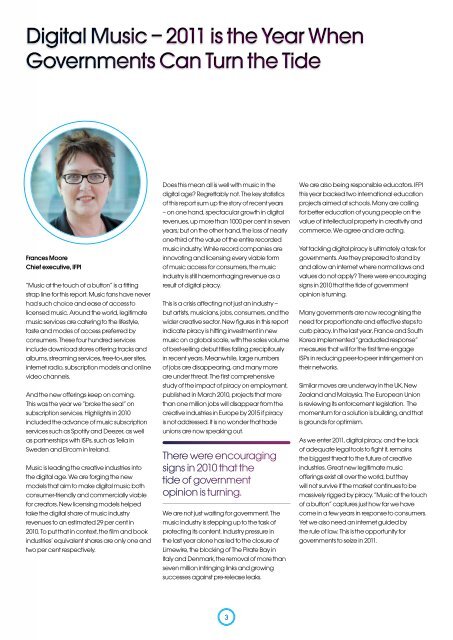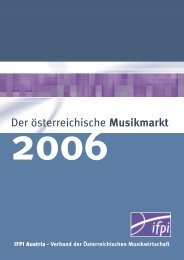IFPI Digital Music Report 2011
IFPI Digital Music Report 2011
IFPI Digital Music Report 2011
You also want an ePaper? Increase the reach of your titles
YUMPU automatically turns print PDFs into web optimized ePapers that Google loves.
<strong>Digital</strong> <strong>Music</strong> – <strong>2011</strong> is the Year When<br />
Governments Can Turn the Tide<br />
Frances Moore<br />
Chief executive, <strong>IFPI</strong><br />
“<strong>Music</strong> at the touch of a button” is a fitting<br />
strap line for this report. <strong>Music</strong> fans have never<br />
had such choice and ease of access to<br />
licensed music. Around the world, legitimate<br />
music services are catering to the lifestyle,<br />
taste and modes of access preferred by<br />
consumers. These four hundred services<br />
include download stores offering tracks and<br />
albums, streaming services, free-to-user sites,<br />
internet radio, subscription models and online<br />
video channels.<br />
And the new offerings keep on coming.<br />
This was the year we “broke the seal” on<br />
subscription services. Highlights in 2010<br />
included the advance of music subscription<br />
services such as Spotify and Deezer, as well<br />
as partnerships with ISPs, such as Telia in<br />
Sweden and Eircom in Ireland.<br />
<strong>Music</strong> is leading the creative industries into<br />
the digital age. We are forging the new<br />
models that aim to make digital music both<br />
consumer-friendly and commercially viable<br />
for creators. New licensing models helped<br />
take the digital share of music industry<br />
revenues to an estimated 29 per cent in<br />
2010. To put that in context, the film and book<br />
industries’ equivalent shares are only one and<br />
two per cent respectively.<br />
Does this mean all is well with music in the<br />
digital age Regrettably not. The key statistics<br />
of this report sum up the story of recent years<br />
– on one hand, spectacular growth in digital<br />
revenues, up more than 1000 per cent in seven<br />
years; but on the other hand, the loss of nearly<br />
one-third of the value of the entire recorded<br />
music industry. While record companies are<br />
innovating and licensing every viable form<br />
of music access for consumers, the music<br />
industry is still haemorrhaging revenue as a<br />
result of digital piracy.<br />
This is a crisis affecting not just an industry –<br />
but artists, musicians, jobs, consumers, and the<br />
wider creative sector. New figures in this report<br />
indicate piracy is hitting investment in new<br />
music on a global scale, with the sales volume<br />
of best-selling debut titles falling precipitously<br />
in recent years. Meanwhile, large numbers<br />
of jobs are disappearing, and many more<br />
are under threat. The first comprehensive<br />
study of the impact of piracy on employment,<br />
published in March 2010, projects that more<br />
than one million jobs will disappear from the<br />
creative industries in Europe by 2015 if piracy<br />
is not addressed. It is no wonder that trade<br />
unions are now speaking out.<br />
There were encouraging<br />
signs in 2010 that the<br />
tide of government<br />
opinion is turning.<br />
We are not just waiting for government. The<br />
music industry is stepping up to the task of<br />
protecting its content. Industry pressure in<br />
the last year alone has led to the closure of<br />
Limewire, the blocking of The Pirate Bay in<br />
Italy and Denmark, the removal of more than<br />
seven million infringing links and growing<br />
successes against pre-release leaks.<br />
We are also being responsible educators. <strong>IFPI</strong><br />
this year backed two international education<br />
projects aimed at schools. Many are calling<br />
for better education of young people on the<br />
value of intellectual property in creativity and<br />
commerce. We agree and are acting.<br />
Yet tackling digital piracy is ultimately a task for<br />
governments. Are they prepared to stand by<br />
and allow an internet where normal laws and<br />
values do not apply There were encouraging<br />
signs in 2010 that the tide of government<br />
opinion is turning.<br />
Many governments are now recognising the<br />
need for proportionate and effective steps to<br />
curb piracy. In the last year, France and South<br />
Korea implemented “graduated response”<br />
measures that will for the first time engage<br />
ISPs in reducing peer-to-peer infringement on<br />
their networks.<br />
Similar moves are underway in the UK, New<br />
Zealand and Malaysia. The European Union<br />
is reviewing its enforcement legislation. The<br />
momentum for a solution is building, and that<br />
is grounds for optimism.<br />
As we enter <strong>2011</strong>, digital piracy, and the lack<br />
of adequate legal tools to fight it, remains<br />
the biggest threat to the future of creative<br />
industries. Great new legitimate music<br />
offerings exist all over the world, but they<br />
will not survive if the market continues to be<br />
massively rigged by piracy. “<strong>Music</strong> at the touch<br />
of a button” captures just how far we have<br />
come in a few years in response to consumers.<br />
Yet we also need an internet guided by<br />
the rule of law. This is the opportunity for<br />
governments to seize in <strong>2011</strong>.<br />
3



